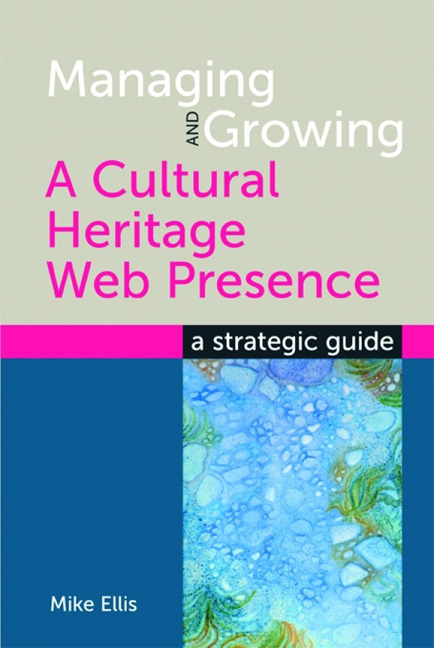Book contents
- Frontmatter
- Dedication
- Contents
- Acknowledgements
- Glossary
- Introduction
- 1 Evaluating what you have now
- 2 Building a strategic approach
- 3 Content
- 4 Marketing
- 5 Policies and guidelines
- 6 Traffic and metrics
- 7 The social web (Web 2.0)
- 8 The website project process
- 9 Away from the browser
- 10 Bringing it all together
- Bibliography
- Index
- Frontmatter
- Dedication
- Contents
- Acknowledgements
- Glossary
- Introduction
- 1 Evaluating what you have now
- 2 Building a strategic approach
- 3 Content
- 4 Marketing
- 5 Policies and guidelines
- 6 Traffic and metrics
- 7 The social web (Web 2.0)
- 8 The website project process
- 9 Away from the browser
- 10 Bringing it all together
- Bibliography
- Index
Summary
Introduction
In this chapter, we'll look at two major trends which have enormous potential impact for cultural heritage organizations: Open Data and the mobile web. These two areas are both about ways of using technology to improve output and outreach, and they both use something different from a desktop browser to do this.
One of the most interesting things about these approaches – as we'll see – is that they give us the opportunity to reach new audiences in new places. These places don't any longer have to be the traditional ones we're used to – at a desktop, on a laptop, etc.; instead content can be authored once and then delivered to many channels: mobile devices, kiosks in museum and library spaces and so on. From a human perspective, this is important because desktops and laptops don't necessarily lend themselves to the ‘invisible' or natural content experiences we've discussed already. Often, given the nature of our organizations, our users are visitors: they are already having a physical experience interacting with our objects, books and archives. Technology is often at its most powerful as an adjunct to rather than a replacement of those experiences.
Both these trends come from outside the cultural heritage domain – in some commercial organizations, for example, these approaches are quite mature and embedded. Cultural heritage organizations have also started embracing both, and (much as trend-spotting is a fool's game) it looks as if they will form an important part of our landscape in the coming few years.
Open Data
What is ‘Open Data'? Wikipedia says this:
Open data is a philosophy and practice requiring that certain data be freely available to everyone, without restrictions from copyright, patents or other mechanisms of control.
As the quote above suggests, Open Data is as much a philosophical approach as anything else, and it is worth spending some time examining why any (cultural heritage) organization might want to make their data available in an open format in the first place, before looking more closely at some of the ways that this can be done.
Why provide Open Data?
At first glance it is hard to understand why an organization that has invested considerable time and effort into – for example – cataloguing their objects or listing their events should then relinquish control of that raw data in such a way that anyone can use it.
- Type
- Chapter
- Information
- Managing and Growing a Cultural Heritage Web PresenceA strategic guide, pp. 179 - 194Publisher: FacetPrint publication year: 2011



